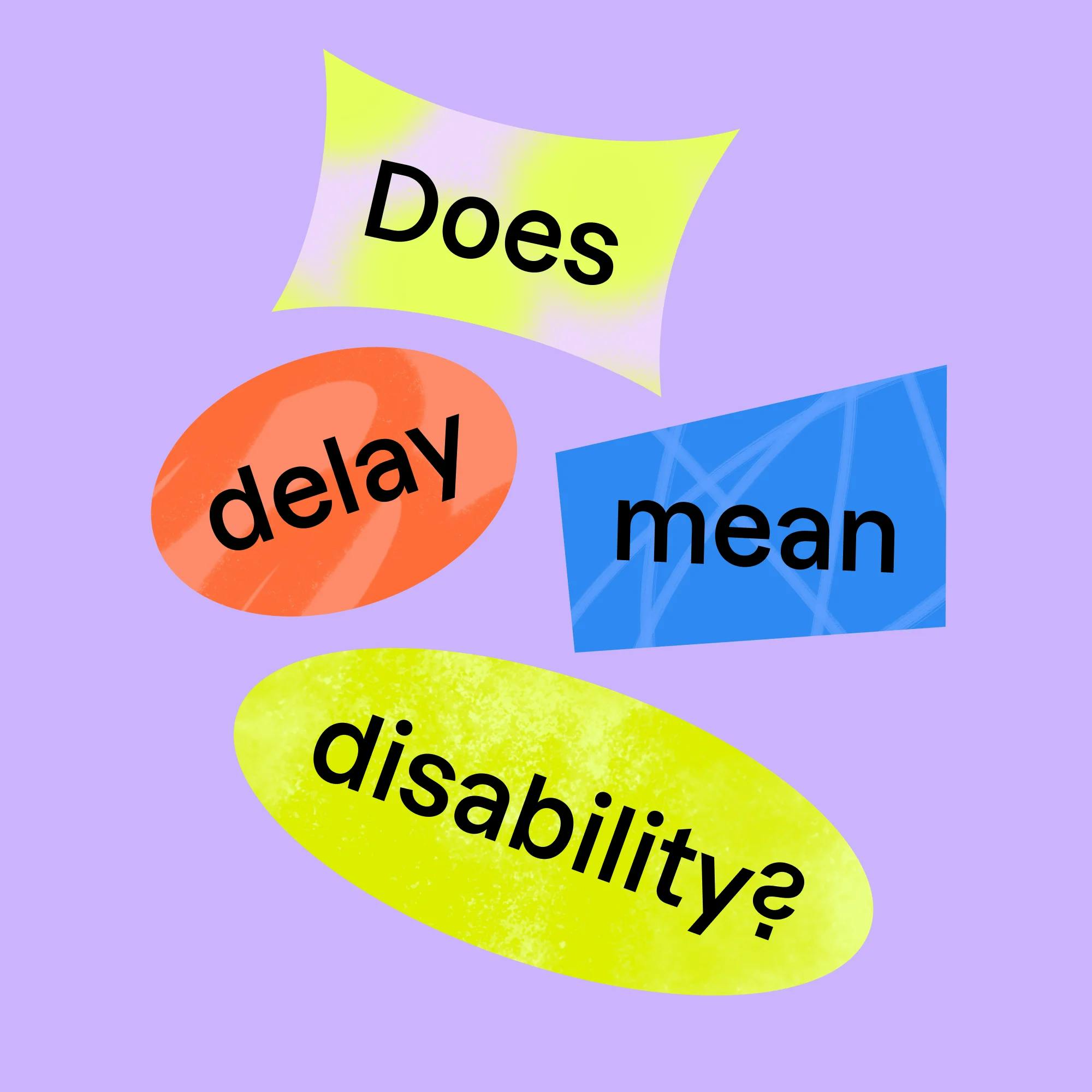If your child is a late talker or seems to be behind in their speech and language development, you may feel worried. You may wonder if your child will catch up, or whether their speech delay is a symptom of a learning disability or other problem.
In this article, we explain the connection between speech delay and learning disabilities, the causes and signs of speech delay, and what to do if you’re concerned. The fact that you’re here learning more is a great first step!
Is a speech delay a sign of a learning disability?
A speech delay may mean that your child’s developmental timetable is simply a little different. In some cases, children eventually catch up on their own. However, speech or language delays can also signal something about your child’s overall physical and intellectual development.
Just because a child has a speech delay does not mean they have a learning disability. However, a speech delay can be an early sign of a learning disability.
ASHA, the American Speech-Language-Hearing Association, has identified signs that a child may have a learning disability. One main sign is that the child has trouble talking about their thoughts and ideas. It may seem like the words they need are on the tip of their tongue, but they have trouble getting the right words out. They might use vague words like "thing" or "stuff," or pause while talking to find the words they need.
Concerned about your child's speech?
We're here for you. Get matched with a speech therapist who's experienced in your child's area of need and available when you are.
 Find a speech therapist
Find a speech therapistOther signs of a learning disability include problems with:
Learning new words that they hear or read
Understanding questions they’re asked and following directions
Remembering numbers in order, as in a phone number
Remembering the details of a story plot or what the teacher says
Understanding what they read
Learning words to songs and rhymes, like nursery rhymes
Telling left from right, which can make it hard to read and write
Learning the alphabet and numbers
Matching sounds to letters, which causes difficulty reading
Writing, such as mixing up the order of letters in words while writing
Spelling
Doing math, such as mixing up the order of numbers
Memorizing multiplication tables
Telling time
Some examples of learning disabilities are:
Dyslexia, or trouble with reading
Dyscalculia, or trouble with math
Dysgraphia, or trouble with writing


Does speech delay mean low intelligence?
It’s important to understand that having a speech delay or a learning disability does not automatically mean a person has low intelligence. Most people with a learning disability have average or even above average intelligence. The learning disability may “get in the way” of being able to demonstrate these skills.
Other causes of speech delay
What is delayed speech a symptom of? Remember, a speech delay does not always mean a learning disability. Here are some other common causes of speech delay:
Oral impairment: Many kids with speech delays have oral-motor problems, which is a problem in the areas of the brain responsible for speech. This makes it hard to coordinate the lips, tongue, and jaw to make speech sounds. These children also might have other oral-motor issues, such as feeding problems.
Hearing loss: A toddler who can’t hear well, or hears distorted speech, is likely to have difficulty forming words. Hearing loss is often overlooked, but fortunately it’s also easily identifiable. One sign of hearing loss is that your child doesn’t acknowledge a person or object when you name them, but does if you use gestures. However, signs of hearing loss may be very subtle. Sometimes a speech or language delay may be the only noticeable sign.
Autism spectrum disorder: Speech, language, and communication problems can be early signs of autism.
Lack of stimulation: We learn to talk from the people around us. So it’s hard for children to naturally pick up speech if they’re not actively engaged with other people, hearing them speak and playing together. Lack of verbal stimulation can keep a child from reaching developmental milestones.
Looking for a speech therapist?
Teletherapy makes it easy. We serve families with a range of speech, language, and feeding needs across the U.S. Get started today!
 Find a speech therapist
Find a speech therapistCommon signs of speech delay
How do you know if your child has a speech delay? Let’s look at some specific, early signs of a speech delay:
By 12 months:
Your child isn't using gestures, such as pointing or waving goodbye
Has trouble imitating sounds
By 18 months:
Your child prefers making gestures over vocalizations (sounds) to communicate
Has trouble understanding simple verbal requests
By 24 months:
Your child can only imitate speech or actions and doesn’t say words or phrases spontaneously
Says only some sounds or words repeatedly, and can't use words to communicate more than their immediate needs
Can't follow simple directions
By 36 months:
Your child doesn’t use at least 200 words
Doesn’t ask for things by name
Is hard to understand, even if you live with them


When should I be concerned about a speech delay?
If your child seems to be behind in their speech and language, make an appointment with a speech therapist. The speech therapist can perform an evaluation to assess your child's skills and determine if speech therapy is needed.
With speech therapy, many toddlers and children who are behind in their communication development grow in leaps and bounds. The right speech therapist will show you how to support your child day to day, as well as how to practice speech and language at home. Not only will your child be able to communicate more clearly with their family, they’ll eventually benefit in the classroom as well.
If you think your child might have a learning disability, talk with their teachers and pediatrician about any testing and evaluation that might be helpful. Your school should be able to do the testing or provide guidance throughout the process.


How to support your child at school
Whether your child has a speech delay, a learning disability, or both, they may need special support and accommodations at school.
In public schools in the U.S., kids with a learning disability are eligible for an IEP plan. This is a legal document developed for each child with special needs. The IEP is created by a team of teachers, specialists, therapists, and parents/guardians to document the goals of the child and how they will be completed in public school. An IEP might include special education services and accommodations, or changes to the child’s learning environment
You’ll also want to learn about Section 504 of the Rehabilitation Act of 1973. This is a civil rights law that bans discrimination on the basis of disability. 504 was created to protect children with special needs. Under this law, schools must produce a formal plan for accommodating a student with a disability, such as providing extra time on tests. 504 plans are not part of special education. They are different from IEPs because they are covered by different laws and work in different ways. The main goal is the same, however: to help students be successful in school.


As your child’s parent or caregiver, you have an important role to play as their advocate! And as your child grows, you can teach them how to speak up and advocate for themselves as well. A good way to start is to learn all about your child’s diagnosis. The goal is to be able to explain your child’s way of learning and communicating to the people involved in their care.
Expressable is here to help
No matter what differences your child may have, your child’s school and therapy team should be there to support them. You can help that process go smoothly by being your child’s biggest cheerleader! It starts with talking to a speech therapist to share your concerns.
At Expressable, we’ve treated thousands of children with a range of speech and language issues. Contact us today–we’re here to answer your questions and help you decide on the right next steps for your child!
How Expressable Can Help
Concerned your child isn't reaching age-expected milestones? Looking for communication support from a professional? Expressable is a national online speech therapy practice serving children and adults. We treat all major areas of communication and feeding, offer flexible hours including evenings and weekends, and accept most major health insurance plans. We’re proud to have earned more than 3,000 5-star reviews from our clients (4.9/5 average).
Our therapy model is centered on parent and caregiver involvement. Research proves that empowering caregivers to participate in their loved one’s therapy leads to better outcomes. That’s why we combine live, 1-on-1 speech therapy with personalized education and home practice activities for faster progress.
Communication is more than words. It’s how we share how we feel and show who we are. We’re here to help you or your child do just that.

 Abby Barnes, M.S., CCC-SLP
Abby Barnes, M.S., CCC-SLP













